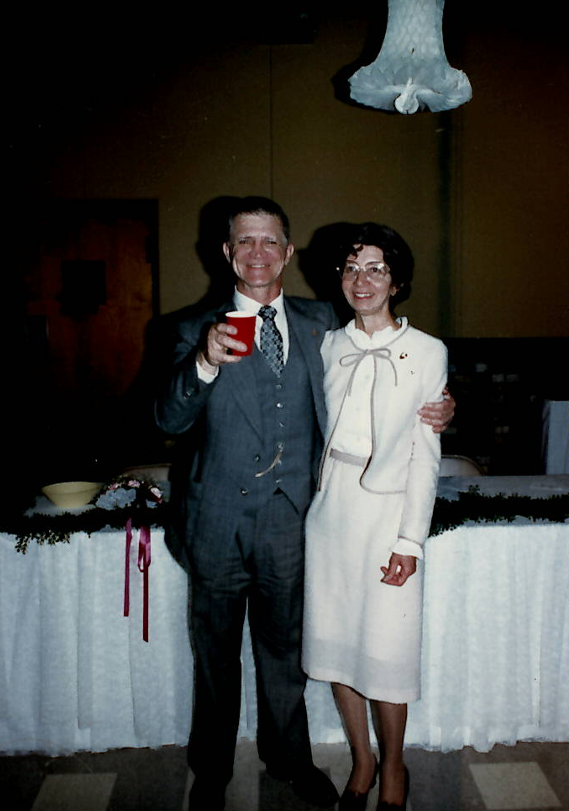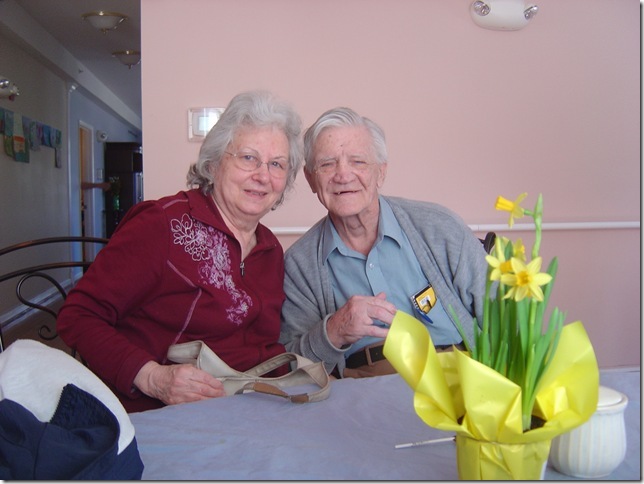Here is a letter that Bill wrote to me in January 1987 when I asked him to write about what life was like while he was growing up.
I ran away from home a couple of times. I guess I was about 8. I lived with Grossmom (Agnes Bethke), Uncle Herman and Uncle Lewis (Louis). Grossmom was some woman! The best I have ever known, and did not appreciate her at the time.
Grosspop (Robert Bethke) at some time after the children were big and leaving home made a return trip to Germany. He ran into some kind of trouble over there and lost all the money he had on him. He had to wire home to get enough money to come home. When he returned, all his ambition was gone. He never did anything but walk around his home place or talk to old man Rich across the road.
Uncle Herman was divorced and living at home. Uncle Louis had gotten hold of some bad homemade whiskey and was not quite right. He would work and do whatever he felt like.
There were 8 cows, 2 horses, chickens, ducks and geese. Grossman did just about all the work. She milked the cows, fed the chickens, cooked, washed clothes, worked in the fields, she never stopped. The milk from the cows was run through a seperator for the cream. This cream was put in 5 gallon cans and stored all week in a milk house. This was a stone house without a floor. It had instead a spring inside that kept about a 4-inch deep water level where the floor would be. Since the spring water was cool, the cans of milk set in the water and the cream kept from spoiling for a least a week. Every Friday, these cans of milk (cream) were carried to the house. Here it was made into butter. The cream was put into a wooden barrel setting in a cradle. This barrel had a bicycle wheel attached to one side. The bicycle wheel was turned by a belt going to an electric motor. Electric bills were 75 cents minimum for a month’s use. Grossmom would make half pound cakes of butter with a wooden mold There was a flower design on top. These half pound cakes were placed in waxed paper to be sold in the market on Saturday.
The buttermilk was left to set up and then placed in a pillowcase-type bag. This filled pollowcase was placed on a sink drain board. Rocks were placed on top of the pillowcase for weight. This weight forced out excess water. What was left was cottage cheese. This was also sold in the market. There was a market house to prepare vegetables for market. One of the things that took a lot of time to prepare were soup herbs. This was a few sprigs of parsley, some thyme, a small stalk of celery and a small slice of carrot. This was washed and tied into a little bundle to be sold for 3 cents each. A lot of people didn’t have much money in those days. They would buy or beg for any meat scraps or bones from the local butcher. The scraps or bones were put into a large pot and cooked with all types of vegetables. When done, the soup herbs were put in to give the soup some flavor. This to many, was a great meal.
Uncle Herman and I would take the soup herbs, butter, vegetables and so on to Canton Market to sell. We had a stall there to sell the produce from. 8 to 8 every Saturday and the money was used to run the farm. You would buy a bushel basket full of groceries in those days for $5.
Grossmom never had any good clothes. I can still see her slopping around the yard in a pair of her son’s old shoes. She also had diabetes and needed insulin shots. There were times when no one was around to give her the shots. I gave them to her and a couple of times I bent the needle – she sure had tough skin. As time when on and because of her slioppy shoes, a toe became infected and had to be removed. I don’t ever remember this woman complain or be sick. She did one hell of a job. I wish I could tell her some time.
Uncle Frederick and Uncle Robert were in World War One. Uncle Robert came back from Eurpoe and never was right. I understand he was gassed. They had to put him in a Veteran’s hospital in Perryville, where he died. Uncle Herman was in World War Two. Grosspop died and Grossmom went to live with her daughter Alvina. White she was there, she fell down and broke a hip and that was it. I had to go back home.
Her children were in this order, I think: Elizabeth, Hugo, Robert, Frederick, Carl, Alvin, Charlotte, William, Herman, Albert and Louis.
There are a lot of things I would have liked to have done. But here is my story starting with going to Rossville School. The school had 7 grades in three rooms. The toilets were outside. Water was brought in by bucket pumped from a well outside. Big boys in the 6th and 7th grades took turns pumping and bringing in the water. Heat was provided in each room with its own coal stove. The big boys took turns hauling in the coal from a small basement storage area. Water wa kept in a pan above the stive to keep the humidity up. The boys took turns filling the pan with water, putting coal in teh stove and removing ashes. The principal kepy children in line. He had the better-behaved boys and girls made “safeties” that would report cursing and unsafe acts to him. The principal I remember was a Mr. Price. On one occasion I was brought in to him for wrongdoing. He told me to put my head on my arms on a desk. He then removed his belt, folded it in half and strapped me about three times. We had one hour for recess. When the weather was good I would have to run home to change over the cow to a new eating place. The cow was kept in place by a crowbar and length of chain. I would then rush into the house and fix some lunch. This was usually the leftover potatoes from last night’s supper. Sometimes I would be late gting back to school as it was a good half mile run in each direction. I also remember one time staying over at school during lunch. I had no lunch. All of the other children were eating. The teacher saw this and she sent over to Volz’s store across the street and bought me a couple of hot dogs. I had a hard time getting through school as I spent two years in the third, fifth and seventh grades. The one thing I liked was when the traveling music teacher came. This was a Mr Veley, who taught us how to read music and we would sing. I even learned how to play a flute. The year I left, Rossville School closed. There never was any talk about going to high school or college. I went to work at Volz’s grocery store across the street from the school. I put in 60 hours a week and go paid $8. About half of this was paid in board. My father tried to get me to save some of the rest but it was not in me to do that. We sold everything in the store: animal feed, gas, meats, and all kind of sundries. I would scrub the floors, fill the shelves and wait on customers. I liked this work and would like a store of my own some day. Some of the prices at this time was: 6 gallons of gas for $1, a quart of oil for 15 cents. You could get a box of crackers, a can of sardines and a coke for less than a quarter. a lot of people would make this their lunch. I sold loose cigarettes – two for one cent.
The store closed and I went to work at Rustless Iron and Steel. Now I started to make some money – $80 a week. I bought a 1931 model A Ford for $125. All my brothers and sisters would ride to church in it on Sunday. I could now buy all the ice cream I wanted and candy – it was great. I worked at Rustless until I went into the service. I had my first train ride all the way to Florida for training. My first plane ride all the way to Iceland (boy what a change!).
I came back home from the service and found everything at home was the same. For some dumb reason I thought people would change. I found they did not or seldom did. I left home and got married to a very nice girl. We had just enough money to pay a month’s rent and the clothes on our backs. I went back to Rustless but didn’t like the shift work and quiet. With no education it was hard to find a good job. Whatever money we had I spent trying to get rich quick.
This didn’t work and we went broke. The marriage broke down. After about six months being separated, we found we needed each other and a new start. We started over. I tried sales jobs, drove a taxi part time and kept looking for that right job. We both tried a little harder and both worked. Wanting a trade, I heard about a scale repair job paying $1.50 an hour to start. I took the job and found it very interesting. It made me use my head and think. The money wasn’t much. I tried to learn electrical repair under the G.I. Bill. I took lessons until my education was found lacking. I wanted to get something or go somewhere in life. The scale company offered to send me to Richmond, Virginia to run a scale repair shop. We had to give it a try and moved to Richmond. This was some change as we were finally on our own. I worked for five years and found the mechanical work going downhill. Everything was going electrical. Traveling on the road and working outside going on 50, I now needed a retirement job.
Well, as luck would have it, with twenty years scale experience and my traveling, I found a new plant being built. This was a large bakery in Richmond and I installed the scales. I landed a job at the plant and found a place to retire. I wrote some of this story on the job, and the pay isn’t bad.




